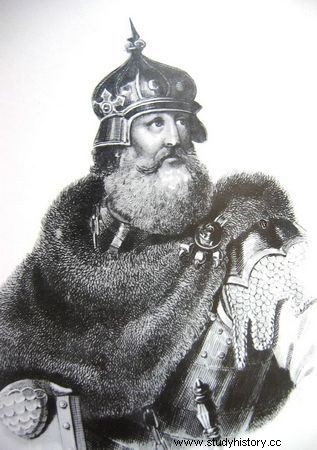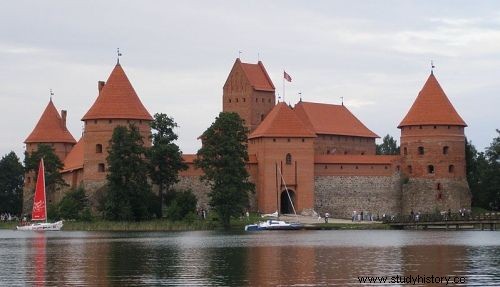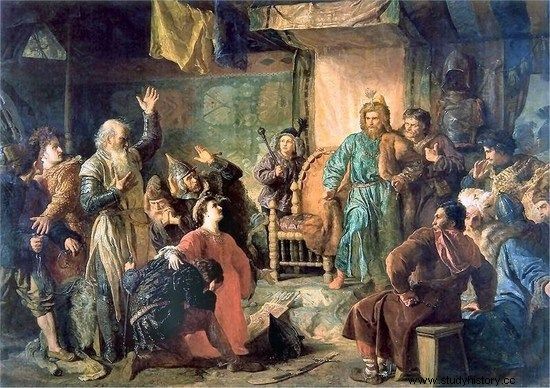From the Polish perspective, Jagiełło's career began in 1386, when he came to Krakow, was baptized and sat on the royal throne. What did he do before? Was he running in the woods with animal skins and a spear in his hand while praying to pagan idols? No way. Jagiełło was a consummate politician and master of intrigue, who ate bread from many ovens. This is perfectly demonstrated by the Lithuanian history textbook of the Grand Duchy of Lithuania.
Jagiełło was the son of Olgierd - a warrior prince who co-ruled Lithuania for over 20 years, sharing power with his brother Kiejstut. He took over from his father in 1377.
According to many Polish historians, he was only 15 years old at the time, but it does not seem likely if we take into account how much he did and how boldly he dealt with the Teutonic Knights. Following Jarosław Nikodem, I will assume that he was then at least a few years older. As a vigorous twenty something, he immediately set about consolidating his position.

Uncle Kiejstut. It took just a few years for him to become Jagiełło's mortal enemy ...
It's good to meet… and plot
In 1377, Kiejstut was still alive, ruling over a large part of the state. Jagiełło's brothers also received their districts. Immediately they began to cause trouble for the new Grand Duke. In the winter of 1377-1378, Andrzej (Olgierd's son from an earlier marriage) fled to Moscow in the hope that he would overthrow Jagiełło with the help of his neighbors.
A year later, Demetriusz Olgierdowicz also joined the Muscovites - when the Ruthenians invaded his estate, he simply went to their side. In the east, the crisis was growing, but the Teutonic Knights also sharpened their teeth on Lithuania, only waiting for the young man, seated on the throne, to slip his leg ...
Jagiełło, however, kept his composure. Breaking with the politics of his father and still having a strong position in his uncle's country, he decided to negotiate with the deadly enemy of the Lithuanians. Zigmantas Kiaupa, one of the authors of the book "History of Lithuania from the oldest times to 1795" wrote:
In 1379, when the Teutonic Knights once again threatened Vilnius, Jagiełło decided to take the first step in a new policy. In the summer he sent his brother Skirgaila to the monastic state to discuss relations between the two states and the possibility of baptism in Lithuania (p. 123) .

Trakai Castle. The seat of Kiejstut (license CC ASA 3.0; photo:Krzysztof Mizera).
Initially, it seemed that the idea would bring amazing results. Already in the fall of the same year, Jagiełło and Kiejstut concluded a truce in Trakai with the Order, which was to ensure the security of the Kiejstut lands for ten years.
For the cunning Jagiello, such protection was not enough. It only strengthened Kiejstut, giving him nothing on his own. Therefore the Grand Duke quickly began plotting on his own . In 1380, in secret from his uncle, he made another pact, this time with the Livonian Order, on the protection of his own estates.
What did he offer on his part? Well: pledged not to support Kiejstut if the monastic state attacked the principality of Trakai (p. 123) .
Betrayals, intrigues, assassinations
The north flank has been secured. The time has come to deal with the threat from the east. In 1380, Jagiełło allied with the Tatar Golden Horde against Moscow. How did he do in the battle that was to dominate all of Russia? Well, it didn't do it at all.
In Kulikowe Pole, the Muscovites defeated the Tatars, while the Lithuanian reinforcements did not reach their destination by a strange coincidence ... Could the cunning Grand Duke predict that even by joint forces it would not be possible to defeat the enemy and that it is better to sacrifice allies than to shed the blood of his kin ?
If Jagiełło really acted deliberately, he almost lost his power. His throne was already shaking, and in addition, Kiejstut learned the terms of a secret contract with the Order . Suddenly it became clear to him why monastic knights ravage his lands with impunity every few months.
The old prince wanted revenge. Not only did he give priority to a puppy, but he also let himself be completely led out of the way! It's time for a rematch. In the fall of 1381 - in the absence of Jagiełło and his faithful Skirgiełło - Kiejstut took Vilnius and officially overthrew his nephew.
Of course, he announced himself as the new grand prince. Then it turned out how strong the position of the young, ambitious Jagiełło is. The people of the capital stood on his side, who did not like Kiejstut's insane politics, ready to fight the Order to the death, regardless of the losses suffered.

For Kiejstut, the conflict with Jagiełło ended tragically. First he was taken prisoner, and only a week later he was dead. Wojciech Gerson in his painting immortalized the moment when Kiejstut and Witold became prisoners of Jagiełło.
As Zigmuntas Kiaupa explains: In June 1382, the Vilnius townspeople, led by the merchant Hanul, started a revolt and joined the army of Jagiełło . The future king of Poland regained the grand-ducal throne, but the civil war was just beginning. Jagiełło quickly renewed the truce with the Order, and then - in July - occupied Trakai:the seat of Kiejstut.
In August, the armies of the two princes faced each other for a decisive battle. Then, however, Jagiełło's uncle's heart softened - or he simply had common sense returned to him and realized that he would not win with his nephew, who had the support of the Order.
Perhaps Kiejstut's conscience was also disturbed, but Jagiełło did not intend to forgive the betrayal. Kiejstut was taken prisoner and after less than a week he was found dead . Did he commit suicide, as Jagiełło's supporters maintained? Well, not necessarily.
Kiejstut's fate was avoided by his son Witold, who fled the fortress just in time and ... joined the Teutonic Knights. Jagiełło quickly felt that the days of his truce with the Order were coming to an end. The time has come to look for a new ally. It was then that the envoys from Krakow appeared in Vilnius, hinting about the possibility of marrying a certain Hungarian princess with an admixture of Piast blood in her veins ...
Source:
- Zigmantas Kiaupa, Lithuania during the reign of Gedyminowicz to be baptized [in:] Zigmantas Kiaupa, Jūratė Kiaupienė, Albinas Kuncevičius, History of Lithuania from the earliest times to 1795 , Polish Scientific Publishers PWN, 2008.
